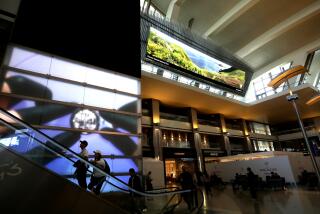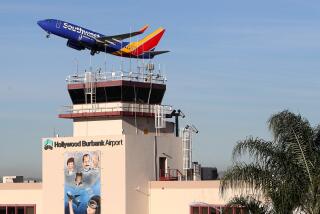Idea of Privatizing U.S. Airports Is Taking Off : Economy: A group of public officials and industry leaders meet near LAX to discuss this method of raising revenue.
- Share via
Former Atlanta Mayor Andrew Young suggested a few years ago that the city consider selling its busy international airport to Japanese companies eager to invest in the Southern metropolis. Many of his constituents thought that he was joking, and nothing has come of the idea.
But airport privatization was no joking matter Friday among a group of airport and other public officials, airline executives, lawyers and investment bankers who met to discuss the growing interest around the country in turning airport operations over to private businesses.
The idea of some form of privatization is gaining credence in part because of the gridlock at the nation’s airports and the slow pace of publicly financed efforts to increase capacity, according to participants in the seminar sponsored by the Santa Monica-based Reason Foundation. Proponents, who argue that private business would make airports more efficient, are also increasingly getting a hearing from local governments frustrated by their inability to recover the huge investments they have put into airports.
Privatization would provide funds to build new and different kinds of airports and might make it easier for new airlines to get landing slots, thus increasing competition for passengers, proponents said.
The seminar was held within clear sight and sound of Los Angeles International Airport, where officials quietly started studying privatization about eight years ago. In considering privatization, officials are trying to “correct what we see as an inequity in the way the national air transportation system is operated and managed,” said LAX director Clifton Moore.
Los Angeles has a tremendous investment in the airport, he said. “Nevertheless, the city has never received 5 cents’ return on the work and investments it has made,” he said, explaining that the city is prohibited from taking any airport revenue into its general treasury.
The city could sell or lease all or part of the airport, he said. One advantage would be that at least part of the airport premises would become part of the city’s tax base.
The United Kingdom cashed in on investments in its airports in 1987 when it raised $2.5 billion from the sale of shares in British Airport Authorities. The company, which operates London’s Heathrow, Gatwick and Stansted airports as well as four in Scotland, now has a $4-billion market capitalization, Roger Kitley, international director of BAA, said at the seminar.
“We have no doubt that BAA’s experience has been a positive one,” Kitley said. The company has been consistently profitable, making $350 million in 1989, he added.
The company’s income per employee has increased 10% since privatization, he said, and it is expanding its operations, including entering into a joint venture with British Rail to build a high-speed rail link from central London to Heathrow.
Although increases in the fees the company charges airlines are limited by regulation, Kitley said, its income from commercial activities at the airports, such as duty-free shops, has increased rapidly.
Proponents of privatization in the United States, including Reason Foundation President Robert W. Poole Jr., said privately owned airports could be operated and regulated as investor-owned utilities are today.
He said privatization is a broad term not limited to the sale of facilities. The most common form of privatization is the granting of a long-term operating lease to a private company. Burbank airport is owned by Burbank, Glendale and Pasadena but has been operated under contract since 1978 by Lockheed Air Terminal.
Ironically, Lockheed Air Terminal, a division of Lockheed Corp., was formed 60 years ago to build the airport in Burbank, said President ViggoButler. The company pioneered privatization of airports, he said, and, “I’m here to bring it back.”
More to Read
Inside the business of entertainment
The Wide Shot brings you news, analysis and insights on everything from streaming wars to production — and what it all means for the future.
You may occasionally receive promotional content from the Los Angeles Times.










